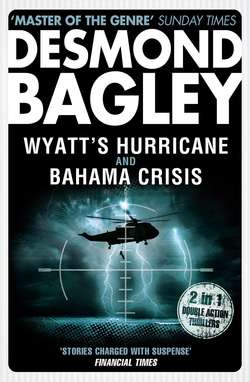Читать книгу Wyatt’s Hurricane / Bahama Crisis - Desmond Bagley, Desmond Bagley - Страница 23
IV
ОглавлениеDawson was astonished at himself.
He had lived his entire life as a civilized member of the North American community and, as a result, he had never come to terms with himself on what he would do if he got into real trouble. Like most modern civilized men, he had never met trouble of this sort; he was cosseted and protected by the community and paid his taxes like a man, so that this protection should endure and others stand between him and primitive realities such as death by bullet or torture.
Although his image was that of a free-wheeling, all-American he-man and although he was in danger of believing his own press-clippings, he was aware in the dim recesses of his being that this image was fraudulent, and from time to time he had wondered vaguely what kind of a man he really was. He had banished these thoughts as soon as they were consciously formulated because he had an uneasy feeling that he was really a weak man after all, and the thought disturbed him deeply. The public image he had formed was the man he wanted to be and he could not bear the thought that perhaps he was nothing like that. And he had no way of proving it one way or the other – he had never been put to the test.
Wyatt’s hardly concealed contempt had stung and he felt something approaching shame at his attempt to steal the car – that was not the way a man should behave. So that when his testing-time came something deep inside him made him square his shoulders and briskly tell Sous-Inspecteur Roseau to go to hell and make it damn’ fast, buddy.
So it was that now, lying in bed with all hell breaking loose around him, he felt astonished at himself. He had stood up to such physical pain as he had never believed possible and he felt proud that his last conscious act in Roseau’s office had been to look across at the implacable face before him and mumble, ‘I still say it – go to hell, you son of a bitch!’
He had recovered consciousness in a clean bed with his hands bandaged and his wounds tended. Why that should be he did not know, nor did he know why he could not raise his body from the bed. He tried several times and then gave up the effort and turned his attention to his new and wondrous self. In one brief hour he had discovered that he would never need a public image again, that he would never shrink from self-analysis.
‘I’ll never be afraid again,’ he whispered aloud through bruised lips. ‘By God, I stood it – I need never be afraid again.’
But he was afraid again when the artillery barrage opened up. He could not control the primitive reaction of his body; his glands worked normally and fear entered him as the hail of steel fell upon the Place de la Libération Noire. He shrank back on to the bed and looked up at the ceiling and wondered helplessly if the next shell would plunge down to take away his new-found manhood.
